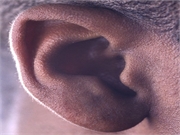
WEDNESDAY, Aug. 26, 2020 (HealthDay News) -- Even if they appear unresponsive, dying people may still be able to hear.
That's the takeaway from a Canadian analysis of hospice patients in Vancouver.
Researchers compared electroencephalography (EEG) data -- a measure of electrical activity in the brain -- collected when patients were conscious and when they became unresponsive at the end of life. Those patients were compared to a healthy control group.
The study looked at brain response to various patterns of common and rare sounds that changed frequency, and found that responses of some of the dying patients were similar to those of healthy people -- even hours before death.
"In the last hours before an expected natural death, many people enter a period of unresponsiveness," said lead author Elizabeth Blundon, a doctoral student in psychology at the University of British Columbia at the time of the study.
"Our data shows that a dying brain can respond to sound, even in an unconscious state, up to the last hours of life," she said in a university news release.
Co-author Lawrence Ward, a professor of psychology, said researchers were able to identify specific mental processes in both groups of participants.
"We had to look very carefully at the individual control participants' data, to see if each one of them showed a particular type of brain response before we felt confident that the unresponsive patient's brain reacted similarly," he said in the release.
The findings were recently published in the journal Scientific Reports.
"This research gives credence to the fact that hospice nurses and physicians noticed that the sounds of loved ones helped comfort people when they were dying," said study co-author Dr. Romayne Gallagher, a now-retired palliative care physician at St. John Hospice in Vancouver.
"And to me, it adds significant meaning to the last days and hours of life and shows that being present, in person or by phone, is meaningful," she said. "It is a comfort to be able to say goodbye and express love."
While the evidence of brain activity supports the idea that dying people might hear, it's not known if they're aware of what they're hearing, Blundon noted.
"Their brains responded to the auditory stimuli, but we can't possibly know if they're remembering, identifying voices, or understanding language," she said. "There are all these other questions that have yet to be answered. This first glimpse supports the idea that we have to keep talking to people when they are dying because something is happening in their brain."
More information
The U.S. National Institute on Aging has more about end of life.
Back

The news stories provided in Health News and our Health-E News Newsletter are a service of the nationally syndicated HealthDay® news and information company. Stories refer to national trends and breaking health news, and are not necessarily indicative of or always supported by our facility and providers. This information is provided for informational and educational purposes only, and is not intended to be a substitute for medical advice, diagnosis, or treatment.






